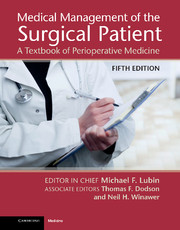Book contents
- Frontmatter
- Dedication
- Contents
- List of Contributors
- Preface
- Introduction
- Part 1 Perioperative Care of the Surgical Patient
- Section 1 General
- Section 2 Cardiology
- Section 3 Hypertension
- Section 4 Pulmonary
- Section 5 Gastroenterology
- Section 6 Hematology
- Section 7 Infectious disease
- Section 8 Renal disease
- Section 9 Endocrinology
- Section 10 Rheumatology
- Section 11 Neurology
- Section 12 Surgery in the Elderly
- Section 13 Obesity
- Section 14 Transplantation
- Section 15 Psychiatric Disorders
- Chapter 43 Psychological and emotional reactions to illness and surgery
- Chapter 44 Depression and the surgical patient
- Chapter 45 Substance abuse
- Section 16 Peripartum Patients
- Part 2 Surgical Procedures and their Complications
- Index
- References
Chapter 43 - Psychological and emotional reactions to illness and surgery
from Section 15 - Psychiatric Disorders
Published online by Cambridge University Press: 05 September 2013
- Frontmatter
- Dedication
- Contents
- List of Contributors
- Preface
- Introduction
- Part 1 Perioperative Care of the Surgical Patient
- Section 1 General
- Section 2 Cardiology
- Section 3 Hypertension
- Section 4 Pulmonary
- Section 5 Gastroenterology
- Section 6 Hematology
- Section 7 Infectious disease
- Section 8 Renal disease
- Section 9 Endocrinology
- Section 10 Rheumatology
- Section 11 Neurology
- Section 12 Surgery in the Elderly
- Section 13 Obesity
- Section 14 Transplantation
- Section 15 Psychiatric Disorders
- Chapter 43 Psychological and emotional reactions to illness and surgery
- Chapter 44 Depression and the surgical patient
- Chapter 45 Substance abuse
- Section 16 Peripartum Patients
- Part 2 Surgical Procedures and their Complications
- Index
- References
Summary
Few voluntary experiences in life challenge the psychological equilibrium of persons more than hospitalization due to major physical illness and surgery. Not only must patients face the prospect of death, pain, and disability, they must acquiesce to do so with the loss of personal control, identity, and independence. Patients must willingly agree to all of these terms in a foreign environment that is created not to meet their needs per se, but more to cater to the needs of bureaucratic institutions that dictate what the patients' needs are to the hospital staff. Moreover, under these conditions patients must be ready to tolerate a never-ending onslaught of repetitive personal questions and humiliating and invasive examinations and procedures. It is a wonder that most patients do not respond to their physicians and other hospital staff with anxiety, fear, anger, and dependency.
Reactions to the stressors mentioned above can vary among patients. Factors that may influence resilience include pre-existing psychological strength, amount of family support available, financial resources, type and extent of illness, surgical procedures involved, and overall prognosis. For example, elderly patients in particular may not have family readily available. Older patients with cognitive impairment may become more confused, disoriented, and agitated without familiar faces to provide a sense of environmental stability. For patients whose prognosis, although improved, may sustain a visible loss of a body part or possible function of a body part, such as women undergoing mastectomy, patients receiving an ostomy, and men undergoing urologic surgery, losing love and sexual desirability or function may lead to a profound experience of grief over the loss. Patients facing financial stressors may suffer from intense anxiety associated with the immediate physical incapacitation after surgery and the fear that they may never be well enough again to deal with their financial obligations.
- Type
- Chapter
- Information
- Medical Management of the Surgical PatientA Textbook of Perioperative Medicine, pp. 465 - 467Publisher: Cambridge University PressPrint publication year: 2013



